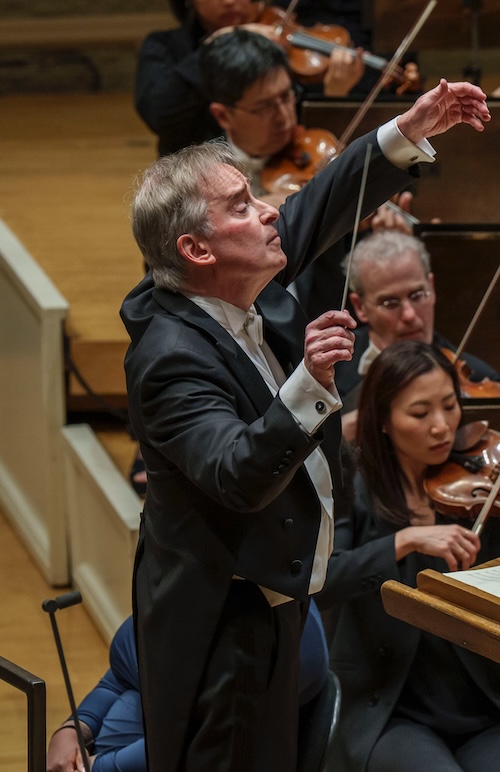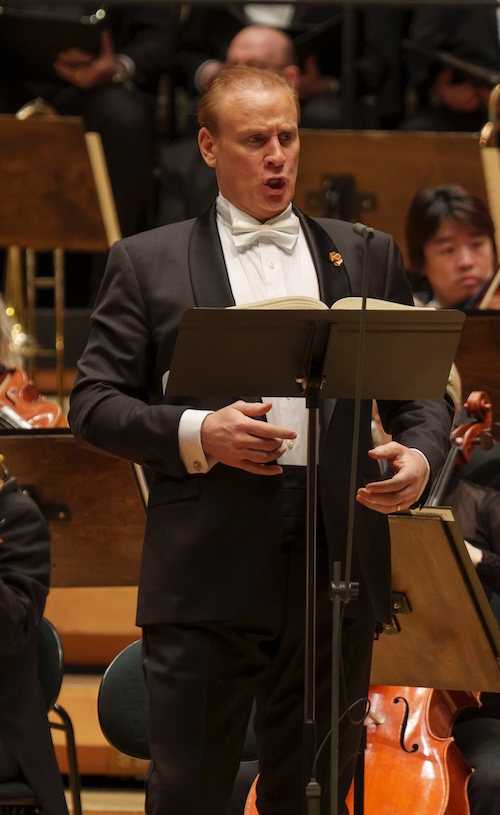“Elijah” rises again in fiery performance from Conlon, CSO Chorus and soloists

Following all the hype and hoopla of last week’s Chicago Symphony Orchestra concert with freshly coronated music director designate Klaus Mäkelä, it was back to musical business Thursday night with James Conlon leading a performance of Felix Mendelssohn’s Elijah.
“I see Elijah as a grand, mighty prophet,” wrote the composer to his librettist Julius Schubring. “I am particularly anxious to do justice to the dramatic elements… [which should be] more prominent as well as more vividly and sharply defined.”
Mendelssohn’s central desire to emphasize the drama in his 1846 oratorio could hardly have been more manifest in the fiery and compelling performance led by Conlon Thursday night. With superb vocalism by the soloists and CSO Chorus, and Conlon directing with fast-moving dramatic acuity, the 130-minute work seemed to fly by.
Elijah draws on Biblical texts in an episodic yet musically cohesive narrative of the stern Jewish prophet who defended the faith against King Ahab and the worshippers of Baal. Mendelssohn’s epic oratorio was one of the great successes of his short life; after leading the premiere in Birmingham, the composer would die the following year, age 38.
Elijah proved an immediate hit in England, epicenter of the amateur choral society, a place it has hardly lost in the ensuing 178 years. The work was nearly as performed on this side of the pond for a century. If Elijah has lost some of its popularity stateside in recent decades—this is the oratorio’s first CSO outing in 13 years—despite stilted moments, Elijah contains much wonderful music. As shown Thursday night, with a top conductor, strong Elijah and first-class chorus, one can still bring vivid life to one of Mendelssohn’s greatest inspirations.
While especially feted for his Mozart and Mahler, James Conlon is such an insightful and consistently reliable interpreter of such a wide range of music that his podium gifts tend to get taken for granted. Though somewhat undervalued at the time, Conlon’s 11-year tenure (2005-15) as Ravinia’s music director is, in hindsight, increasingly looking like a golden age for the North Shore festival.
Music director of LA Opera for nearly two decades, Conlon provided a fizzing immediacy and sense of the theatre to Mendelssohn’s music. Each of the oratorio’s two 65-minute parts went with firm grip and a sense of coursing momentum, one number leading immediately into the next. While Conlon invested the big choruses with stirring impact, he was equally adept in the more intimate moments, bringing sensitivity and space to Elijah’s interior arias and the dialogue between the prophet and the Widow, who begs Elijah to save the life of her dying son.
Lucas Meachem has given impressive performances at Lyric Opera as Don Giovanni and Yeletsky in Queen of Spades (the sole bright spot in an abysmal production). Last November he starred in the world premiere of Joby Talbot’s The Diving Bell and the Butterfly at Dallas Opera.

Thursday’s concert marked Meachem’s downtown CSO debut. From his commanding first utterance—cleverly placed by Mendelssohn before the Overture—the American baritone proved a strong and stirring Elijah, and one could hardly imagine a more complete performance of the title prophet. Meachem’s vocal power and low-end bass weight brought the requisite patriarchal authority and gravitas to the declamatory passages that make up much of this role.
Yet while stentorian in his cries to the worshippers of Baal to summon their gods, Meachem also provided a sensitivity and expressive poise in the more intimate moments—comforting in his dialogue with the Widow, and warmly communicative in “Lord God of Abraham, Isaac and Israel.” Meachem’s affecting rendition of “It is enough” was a highlight of the evening, Conlon and the CSO cellos leading warmly sympathetic support. Meachum also delivered a sweetly sung “For the mountains shall depart,” aided by Lora Schaefer’s equally sensitive obbligato oboe.
As with most modern Elijah performances, the CSO skimped on the soloists, giving us a cost-effective four singers instead of the eight Mendelssohn asks for. While the other three versatile soloists handled their assignments effectively, some of the subtleties of Mendelssohn’s vocal scoring were necessarily lost with most of the quartets and double quartet given to the chorus, not always convincingly.
Soprano Masabane Cecilia Rangwanasha brought clear diction and apt purity of tone to her angelic utterances, dramatic fervor to the Widow and an apt beneficent glow to “Behold, God hath sent Elijah the prophet.”
Issachah Savage made a star turn out of the small role of Obadiah, displaying his big, vibrant tenor in a gorgeous rendition of “If with all your hearts, you truly seek Me.” Mezzo-soprano Ashley Dixon was not quite on the same level as her colleagues, fitfully anodyne in her vocalism and bringing insufficient fire to Queen Jezebel’s confrontation with Elijah.
All four singers blended gratefully in the final quartet. From the front row of the balcony, young singer Lincon Reed lent her piping and polished treble to the role of the Boy.
The CSO Chorus’s appearances this season are also serving as live auditions for the open position of chorus director. Prepared by Eugene Rogers, artistic director of The Washington Chorus, the CSO ensemble sang with striking power and corporate commitment. Words could have been clearer at times in Part Two but the big choral moments were overwhelming in their amplitude and dramatic impact.
Apart from some errant violin ensemble in the early going, the orchestra provided a similarly dedicated and polished performance under Conlon’s direction.
Elijah will be repeated 7:30 p.m. Friday and Saturday. cso.org
Posted in Performances



Posted Apr 14, 2024 at 7:44 pm by Ned R. Turner
I thoroughly enjoyed Elijah, which we saw on Saturday evening. Too bad so few audience members were there.
Your review is superb. You give criticism fairly and justly and your insights are wonderful.
Ned Turner